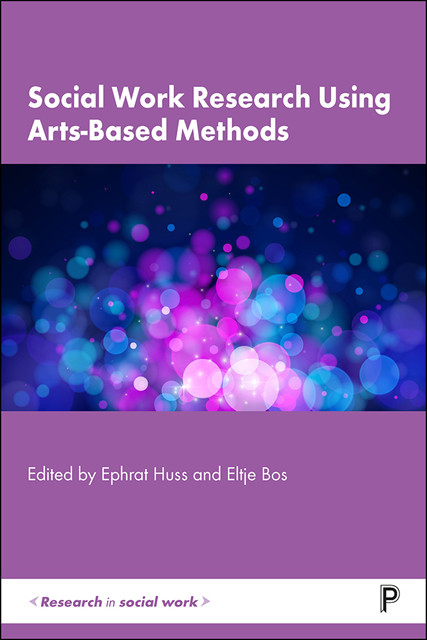Book contents
- Frontmatter
- Dedication
- Contents
- List of figures and tables
- Notes on contributors
- Introduction
- Section I Arts-based research as a method to understand and give voice to marginalised groups
- Section II Using arts-based research to listen to, and give voice to, children in social work
- Section III Arts-based research as a way for researchers and community members to understand communities
- Epilogue
- Index
9 - Arts-based research work with migrant children
Published online by Cambridge University Press: 13 October 2022
- Frontmatter
- Dedication
- Contents
- List of figures and tables
- Notes on contributors
- Introduction
- Section I Arts-based research as a method to understand and give voice to marginalised groups
- Section II Using arts-based research to listen to, and give voice to, children in social work
- Section III Arts-based research as a way for researchers and community members to understand communities
- Epilogue
- Index
Summary
‘Migrant children represent a significant share of the refugee population’ (IOM & UNICEF). Many are growing up in bleak conditions, surrounded by poverty and violence. Education is widely recognised as a mean to foster successful integration, but it is not always available or is sometimes too formal with a focus on the values, norms, and experiences of the native population.
This can lead to migrant children and ethnic minority pupils gradually developing a sense of inferiority, irrelevance, and resentment (Szalai, 2011, p. 67).
Fieldwork supports the importance of informal arts-based education by showing that:
Almost all youths enjoyed taking part in certain remedial and recreational educational activities. For most of them, participation in a wide range of off-site activities, such as language courses, football and basketball, music, painting, and break-dance classes, was a source of excitement.
(Daskalaki & Leivaditi, 2018)Such engagement in combined educational and recreational activities has therefore led many educators to turn to art as a facilitator for learning, socialising, understanding a difficult past, and exploring new directions for the future.
During the last 20 years, many artists have been contributing to these arts-based educational experiments. They are convinced that art has a role to play in providing a wider and more complex vision of reality. Then too, researchers have recognised art as a legitimate and useful methodological approach (Greenwood, 2012) to explore the acquisition of knowledge and social inclusion (Jindal-Snape et al., 2018). Arts-based research (ABR) uses art as a methodological research tool in its data generation, analysis, interpretation, and representation. It also presents art as a theoretical and practical way to address social research questions.
This chapter will focus on ABR methodology to explore the experience of migration by children. It is based on the description and analysis of two experiments led in Orleans (France) with two Syrian refugee artists – Diala Brisly and Manar Bilal. And it is linked with the heuristic approach of Childhood Studies, which places the expression of young people at the heart of the system. The idea is to present artworks and art activities that enable the children to describe, express, and communicate their thoughts, help them consolidate their identity, and tell their story – knowing that these stories are often objectified by the strategies of politicians, media, or educators.
- Type
- Chapter
- Information
- Social Work Research Using Arts-Based Methods , pp. 102 - 116Publisher: Bristol University PressPrint publication year: 2022



